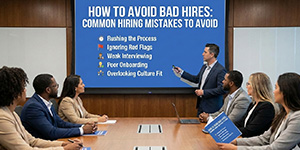Top 5 Common Interview Questions and Responding Answers
Preparing for a job interview can be nerve-wracking, but understanding the common interview questions and crafting the best responses can significantly boost your confidence. This article offers a comprehensive interview preparation guide, covering behavioral interview questions and answers, tips for answering common interview questions, and strategies to avoid top interview mistakes. Whether you're a first-time job seeker or a seasoned professional, these insights will help you shine in your next interview.
The Importance of Interview Preparation
Proper preparation is the foundation of interview success. By familiarizing yourself with frequently asked interview questions, rehearsing responses, and adopting key interview tips for job seekers, you can approach the interview with confidence and professionalism.
Preparing the best answers to interview questions is essential for making a lasting impression during a job interview. To craft the best responses, focus on aligning your skills and experiences with the job requirements, using specific examples to highlight your achievements.
Practice common interview scenarios, such as describing your strengths, handling challenges, or discussing teamwork, to deliver polished and confident replies. Incorporating research about the company and its values can further elevate your best answers to interview questions, showcasing your enthusiasm and preparation. Ultimately, tailoring your responses to the role demonstrates your genuine interest and ability to contribute effectively. Discover more about job interview tips
Top Common Interview Questions
Here are some of the most frequently asked interview questions and tips for crafting effective answers:
1. Tell me about yourself.
How to Answer: Start with a brief overview of your professional background, focusing on relevant skills and experiences. Conclude by connecting your past achievements to the role you're applying for. Avoid overly personal details.
2. What are your strengths and weaknesses?
How to Answer: For strengths, highlight qualities relevant to the job, such as problem-solving, leadership, or technical skills, supported by examples. For weaknesses, choose an area you’re improving, and explain the steps you're taking to address it.
3. Why do you want to work here?
How to Answer: Demonstrate your knowledge of the company by discussing its mission, values, or recent achievements. Connect your career goals to how the company aligns with them. This shows both research and genuine interest.
4. Can you describe a challenging situation and how you handled it?
How to Answer: Use the STAR method (Situation, Task, Action, Result) to structure your response. Focus on a specific challenge, how you resolved it, and the positive outcome it produced.
5. Where do you see yourself in five years?
How to Answer: Show ambition while being realistic. Discuss goals related to professional growth, skill development, and how you see yourself contributing to the company over time.
By preparing thoughtful responses to these common interview questions, you'll boost your confidence and leave a strong impression.
Behavioral Interview Questions and Answers
Behavioral interview questions assess how you’ve handled situations in the past. These questions often begin with phrases like "Tell me about a time when…" or "Give an example of…". Using the STAR method (Situation, Task, Action, Result) can help structure your answers.
Examples:
• "Describe a challenging project you worked on and how you handled it."
o Answer: "In my last role, I managed a marketing campaign with a tight deadline (Situation). My task was to ensure timely delivery while maintaining quality. I prioritized tasks, delegated effectively, and communicated regularly with stakeholders (Action), resulting in a campaign that increased engagement by 40% (Result)."
• "Tell me about a time you resolved a conflict at work."
o Answer: "When two team members disagreed on resource allocation (Situation), I facilitated a meeting to hear both perspectives (Task). By suggesting a compromise and realigning priorities (Action), we met the deadline and maintained team morale (Result)."
Tips for Answering Common Interview Questions
1. Be Concise Yet Comprehensive
. Avoid rambling. Aim to provide clear, structured answers within 2–3 minutes.
2. Showcase Achievements
. Quantify your impact whenever possible. For example, "Increased sales by 25%" is more compelling than "Improved sales."
3. Tailor Responses
. Customize your answers based on the job description and company values.
Answering Tough Interview Questions
Sometimes, you'll face challenging questions that require critical thinking and composure. Here's how to navigate them:
• "Why should we hire you?"
o Frame your answer around the company’s needs.
o Example Answer: "With my extensive project management experience and proven ability to deliver under pressure, I’m confident I can contribute significantly to your team."
• "Where do you see yourself in five years?"
o Show ambition but ensure alignment with the role.
o Example Answer: "I see myself growing into a leadership position, continuing to contribute to innovative projects like those at your company."
Job Interview Do’s and Don’ts
Do’s:
1. Research the Company
. Understand its mission, products, and industry position.
2. Dress Professionally
. Align your attire with the company culture.
3. Practice Mock Interviews
. Rehearse with a friend or use online tools.
4. Ask Insightful Questions
. Show curiosity by asking about team dynamics or growth opportunities.
Don’ts:
1. Arrive Unprepared
. Lack of preparation reflects poorly on your professionalism.
2. Criticize Previous Employers
. Stay positive and focus on your own growth.
3. Interrupt or Dominate the Conversation
. Balance assertiveness with active listening.
Top Interview Mistakes to Avoid
1. Failing to Prepare for Behavioral Questions
. Structured responses are crucial for these types of questions.
2. Neglecting to Follow Up
. A post-interview thank-you email reinforces your interest in the role.
3. Overlooking Body Language
. Maintain eye contact, smile, and sit upright to convey confidence.
How to Prepare for an Interview
Effective preparation involves more than just practicing answers. Here’s a step-by-step interview preparation guide:
1. Understand the Job Description
. Identify key skills and align your experiences with them.
2. Research the Interview Format
. Know whether it’s in-person, virtual, or panel-style.
3. Prepare Your Documents
. Bring copies of your resume, portfolio, and references.
4. Rehearse Key Answers
. Practice responses to common interview questions and tough scenarios.
5. Plan Your Route
. Arrive 10–15 minutes early to make a positive impression.
Tips for Answering Behavioral Interview Questions
1. Use the STAR Method
. Structure your responses to provide a clear narrative.
2. Relate to the Role
. Emphasize skills relevant to the job.
3. Highlight Growth
. Discuss lessons learned from challenging situations.
Frequently Asked Interview Questions
While each industry has specific queries, some frequently asked interview questions are universal:
• "Why do you want this job?"
• "Can you explain this gap in your employment?"
• "How do you handle pressure?"
• "What motivates you?"
Preparing for these ensures you won’t be caught off guard.
Interview Tips for Job Seekers
1. Confidence is Key
o Confidence can set you apart from other candidates.
2. Stay Positive
o Focus on what you bring to the table rather than what you lack.
3. Learn From Rejections
o Seek feedback after interviews to refine your approach.
Interview Preparation Checklist
Here’s a handy checklist to ensure you’re interview-ready:
| Task | Completed |
| Research the company | ✅ |
| Practice answering key questions | ✅ |
| Plan professional attire | ✅ |
| repare necessary documents | ✅ |
| Follow up with a thank-you email | ✅ |
Conclusion
Interviews are gateways to career opportunities, and mastering common interview questions can significantly enhance your chances of success. With a thorough interview preparation guide, strategic responses to behavioral interview questions and answers, and an understanding of job interview do’s and don’ts, you’ll be well-equipped to make a lasting impression.
Remember, preparation is more than half the battle. With practice, poise, and these expert interview tips for job seekers, you can navigate even the toughest interviews with confidence.
Read More: Salesforce Admin Interview Questions and Answers
FAQs
1. What are the most common interview questions to prepare for?
Typical questions include "Tell me about yourself," "What are your strengths and weaknesses?" and "Why do you want to work here?"
2. How can I best answer common interview questions?
Research the company, practice your responses, and use structured approaches like the STAR method for behavioral questions.
3. Why are common interview questions so important?
They help employers assess your skills, personality, and fit for the role while giving you a chance to showcase your qualifications.
4. Do common interview questions vary by industry?
Yes, while some questions are universal, others may be tailored to the specific skills and knowledge required for the industry.
5. How can I practice for common interview questions?
Conduct mock interviews, rehearse with a friend, or record yourself answering questions to refine your delivery and boost confidence.





